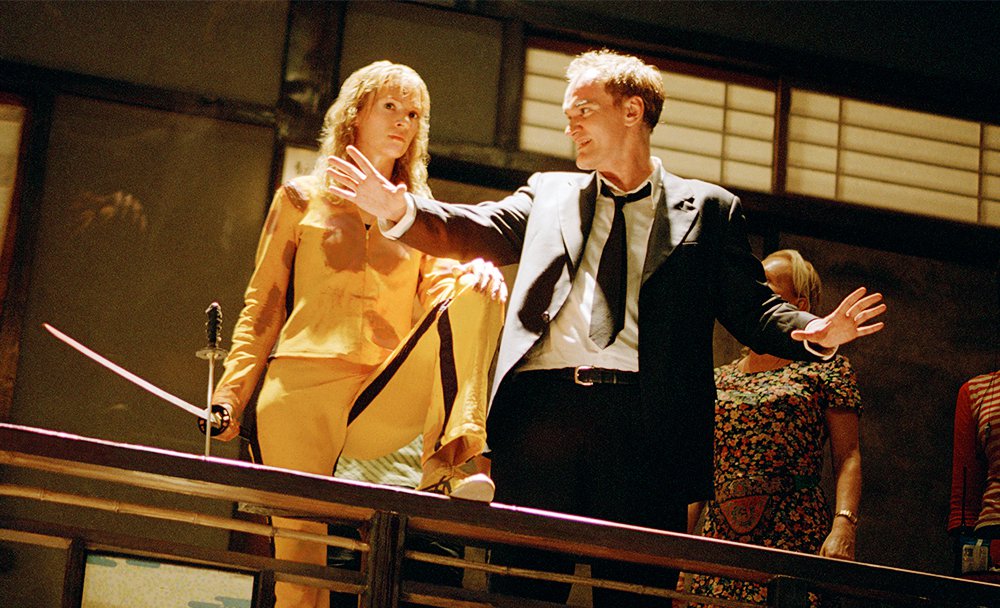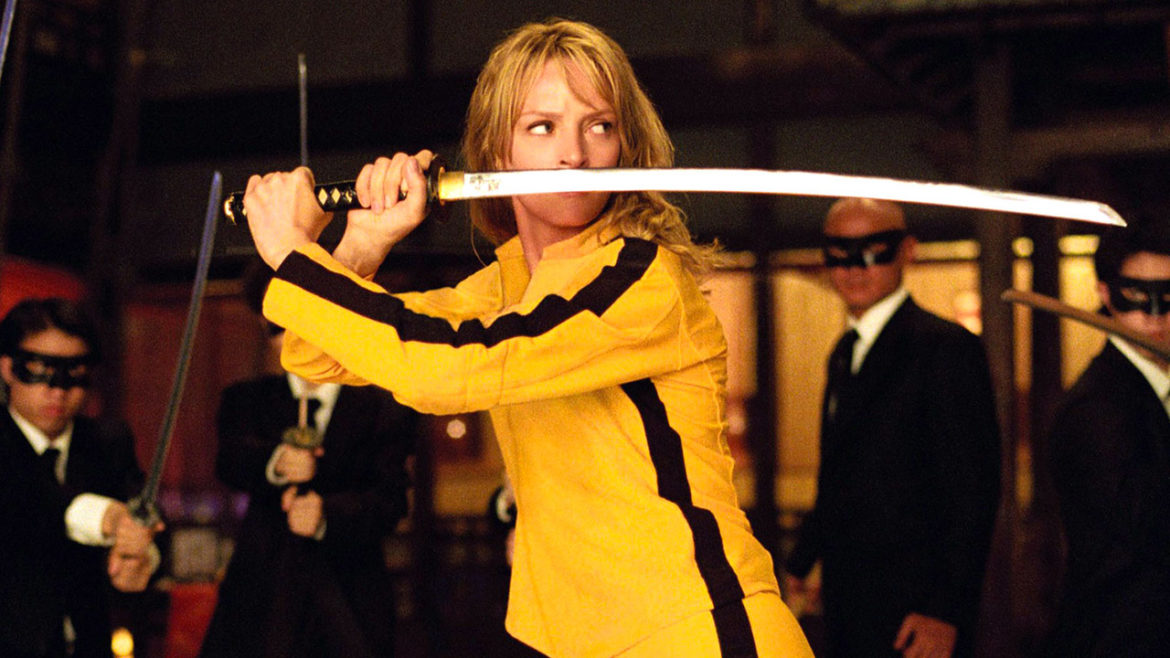Kill Bill, directed by Quentin Tarantino and executively produced by Harvey Weinstein, is known by many to be a feminist movie due to its protagonist Beatrix Kiddo who is played by Uma Thurman. Thurman reportedly received feedback from many women who claim the movie gave them “survival energy”. In fact, it’s no secret that the movie is seen as an empowerment film for women.
At first glance, the storyline of the movie shows itself to be feminist but the sexist stories surrounding the film and its production actually tear down its premise. Thurman has come out to explain the conditions she had to work in and the experiences she dealt with that were “dehumanization to the point of death.” This article is not written to discredit the actual feminist characters in the movie, it is instead written to bring light to the many events that Uma Thurman had to endure on set and how Quentin Tarantino uses “feminism” to gain more credit than he deserves.
Below are five events that either happened during the production of Kill Bill or in the movie storyline that might make you rethink calling it a feminist film.
Tarantino spat on her
On the set of Kill Bill, Thurman’s character was supposed to get spat on by her co-star Michael Madsen. However, Tarantino did not believe that Madsen spat in the way he wanted. So Tarantino did it himself. The actor was hired to play the role of a degrading man who spat on a woman. For the director to do it is incredibly inappropriate. Tarantino said that he tried to used fake spit however he claimed that it did not look real enough to him. This is juxtaposed to Tarantino’s trademark of using an excessive amount of fake blood in all of his movies including all Kill Bill movies. For Tarantino to claim that he spat on Thurman for “authenticity” is a loophole for him to get away with spitting on her, which he is being excused for constantly.
Car Crash
Uma Thurman has said that Tarantino did not like hearing the word “no.” This led to Thurman being forced into a scene she was uncomfortable doing. The scene required her to drive more than 40mph on a sand road that was not straight. But Tarantino convinced her into doing the scene by telling her, “I promise you the car is fine. It’s a straight piece of road.” Thurman was pressured into completing the scene even though she could tell that the seat wasn’t screwed down properly, which she told Tarantino. The car crashed and she suffered many injuries which she described as “in a neck brace with my knees damaged and a large massive egg on my head and a concussion.” Tarantino has since given Thurman a portion of the video of said crash, 15 years later, to expose the cover-up he had been involved in since it happened. This does not excuse his blatant neglect of Uma Thurman’s uneasy feelings.

The Infamous Harvey Weinstein
Before more than 87 brave women came forward to speak against Harvey Weinstein and his undismissable sexual harassment and assault actions, he was just known as a producer who Uma Thurman viewed as a colleague. Before the actual production of Kill Bill, Thurman was already well acquainted with Harvey Weinstein and his tactics of sexual assault. Before the first “attack”, Weinstein tried to persuade Thurman into a steam room in London. However, she was fully dressed and confused about the situation, so he became “very flustered” and did not try any further. He sexually assaulted Thurman soon after this steam room incident. Thurman described herself in this situation as “an animal wriggling away, like a lizard. I was doing anything I could to get the train back on the track. My track. Not his track.” This attack was followed with creepy actions such as Weinstein sending her yellow roses with a note saying “you have great instincts.” Sexual harassment and assault was not widely recognized in society back when the filming of Kill Bill began. It was against the status quo to even bring it up, so Thurman did not know if anyone ever dealt with what she went through. Because of the taboo subject, Thurman was ultimately forced to interact with her abuser on Kill Bill. Weinstein was confronted by Quentin Tarantino himself at the Cannes Film Festival in 2001 about Weinstein’s advances towards Thurman. Weinstein was “hurt and surprised by her accusations” however Thurman did not back down from the situation and instead firmly reiterated what he did to her in London. He gave her what she describes as a “half-assed” apology for his actions after she noticed “his eyes changed and he went from aggressive to ashamed.”
Fighting Male Opponents
This point is mainly for those who have watched Kill Bill and can recall the scenes of Beatrix killing those who have wronged her. Beatrix had no problem killing the first two women in the Deadly Viper Assassination Squad, Vernita Green and O-Ren Ishii, regardless of O-Ren’s powerful Yakuza gang attacking her from all sides. However, when Beatrix confronts Budd he somehow was able to overpower her and lock her away. Unlike the other two, Budd got a warning from Bill about Beatrix coming to kill him however why couldn’t a female be the one who took down Beatrix instead of a male co-star? Small as the point might be, it is interesting to think about why Tarantino gave power to a male character instead of a female one in this movie that he claims himself is “a film about girl power.”
Siding with Rapists
Beatrix’s revenge begins as soon as she awakens from a four year coma and finds out that her male nurse, Buck, has been renting her body for pleasure to men. This is an uncomfortable situation that everyone would condemn. Everyone, of course, other than Quentin Tarantino himself. In a 2003 Vanity Fair article titled “The Return of Quentin Tarantino,” questions about this specific scene were carefully brought up to Tarantino. He replied with careless enthusiasm saying “You know what? If there was some patient in a coma for four years—a total Jane Doe, no one knows who she is, no one cares who she is—and she looked like Uma Thurman, I bet you people’d be fucking her! If no one gives a damn—Jane Doe? Yeah, boy!” As if that comment wasn’t sexist and rape-y enough he goes on to describe Bill “as a ‘pimp,’ with the DIVAS as part of his ‘stable’ of ‘whores’.”
There will always be two sides to a story. A director will always have a different outlook and visual goal than the actors and actresses. However, the traumatizing and life-changing events that Uma Thurman endured while on set with Tarantino and Weinstein are inexcusable. Kill Bill will almost always be known as an iconic feminist movie due to the female actresses and the storyline. But what many women refer to as Beatrix’s actions of “survival energy” is actually Uma Thurman struggling to survive on a set that not only brought her physical pain, but has also caused her emotional and mental pain.
By: Kerasa Tsokas

